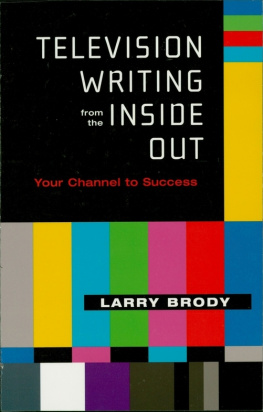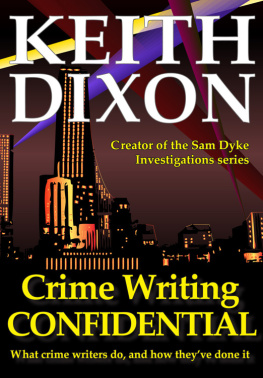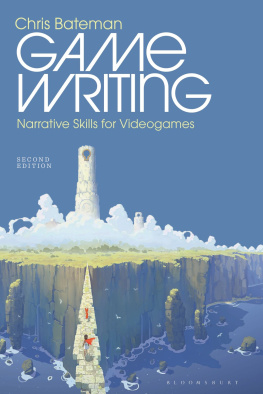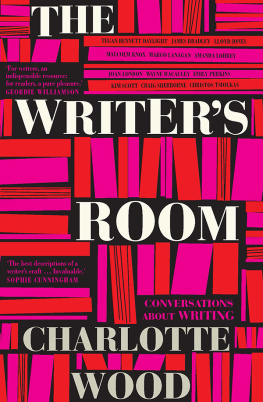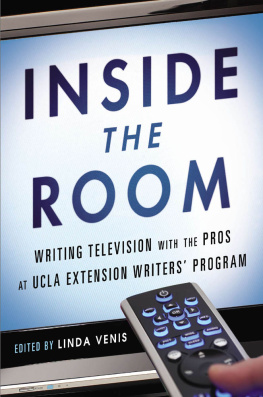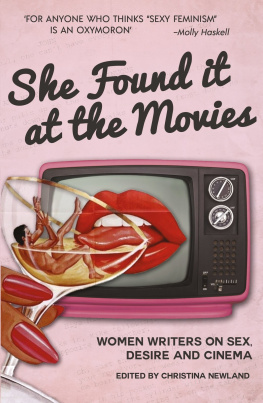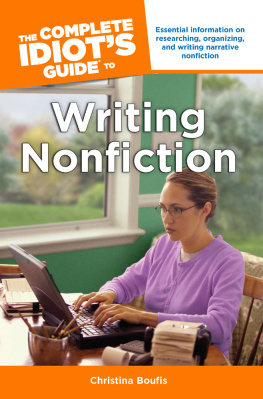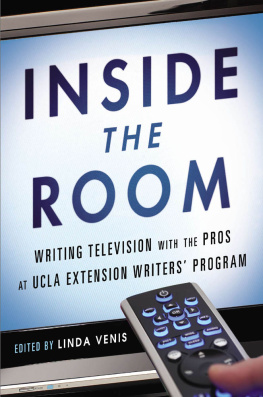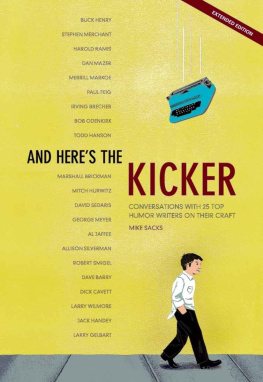Inside the Writers Room
Conversations with American TV Writers
Christina Kallas


Christina Kallas 2014
All rights reserved. No reproduction, copy or transmission of this publication may be made without written permission.
No portion of this publication may be reproduced, copied or transmitted save with written permission or in accordance with the provisions of the Copyright, Designs and Patents Act 1988, or under the terms of any licence permitting limited copying issued by the Copyright Licensing Agency, Saffron House, 6-10 Kirby Street, London EC1N 8TS.
Any person who does any unauthorized act in relation to this publication may be liable to criminal prosecution and civil claims for damages.
The author has asserted her right to be identified as the author of this work in accordance with the Copyright, Designs and Patents Act 1988.
First published 2014 by
PALGRAVE MACMILLAN
Palgrave Macmillan in the UK is an imprint of Macmillan Publishers Limited, registered in England, company number 785998, of Houndmills, Basingstoke, Hampshire RG21 6XS.
Palgrave Macmillan in the US is a division of St Martins Press LLC, 175 Fifth Avenue, New York, NY 10010.
Palgrave Macmillan is the global academic imprint of the above companies and has companies and representatives throughout the world.
Palgrave and Macmillan are registered trademarks in the United States, the United Kingdom, Europe and other countries.
ISBN 978-1-137-33811-2 hardback
ISBN 978-1-137-33810-5 paperback
This book is printed on paper suitable for recycling and made from fully managed and sustained forest sources. Logging, pulping and manufacturing processes are expected to conform to the environmental regulations of the country of origin.
A catalogue record for this book is available from the British Library.
A catalog record for this book is available from the Library of Congress.
Printed in Great Britain by
CPI Group (UK) Ltd, Croydon, CR0 4YY
To Alex, always
Contents
Acknowledgments
My deep admiration for the work of the dramatic writers presented here and a strong desire to unfold the creative process leading to the work were both the first spark of inspiration and the continuous driving force behind this book. I hope you will enjoy it as much as I have enjoyed having the conversations that make up the biggest part of its contents, and that you will be as fascinated as I was by the recurring themes which I have essayed in my final reflections. Thank you, one and all! Your enthusiasm, and your willingness to respond as openly as possible, made this book. Acknowledgment is also made of the inspiring writers I spoke with at the very early stages, when I was still defining my focus for this book: Peter Blauner, Julie Martin, Howard Korder, thank you! In addition, I would like to thank Baldvin Kri, who was my trusted assistant during the final stages of the book, John Howard and Alison G. Vingiano who read parts of the manuscript and assisted me with their notes, my always supportive agent, Julian Friedmann and, last but not least, Jenna Steventon and Felicity Noble at Palgrave Macmillan: your assistance was a timely and wonderful encouragement. Finally, and with all my love always, to my son Alex: here, a book full of creative, fearless writers what a beautiful thing!
About the Author
Christina Kallas is a writer-producer for both film and television, professor of film and president of the Federation of Screenwriters in Europe (FSE). Screen credits include the feature films Mothers (2010), The Commissioner (1998), I.D. (1994) and Liebe Lgen (1997); several episodes of the Best German TV-awarded series Edel & Starck (20022005) and Danni Lowinski (20102012); and the long-form narrative transmedia project 42 Seconds of Happiness (20112014). She is currently teaching at Columbia Universitys School of the Arts, Film Division, at Barnard College and at the New School for Media Studies in New York City. She earned her BA, MA and PhD in Communication and Media Studies at Freie Universitt Berlin, during which time she was a Daimler-Benz-Stiftung fellow. She has previously taught at the German Film and Television Academy Berlin, the International Film School in Cologne and the Film Studies Department of the Aristotle University of Thessaloniki. She is the author of five books in her three writing languages, including Creative Screenwriting: Understanding Emotional Structure (London/New York, 2010).
Introduction
High art era
The popular art of one era is often the high art of the next, wrote the Greek-American literary scholar Alexander Nehamas not so long ago in defense of television, drawing a parallel with Platos scorn of Ancient Greek drama. TV has long been considered the lesser counterpart to cinema: the place to go in the industry if you couldnt make it into film. For a very long time it was also considered a subject not worthy of academic study. Not so today. With television drama achieving both popular and critical acclaim, it would seem that TV is finally going through its high art era, and that it has emerged from cinemas shadow for good.
Filmmakers have always flirted with television. One has only to recall, from 1980, Rainer Werner Fassbinders Berlin Alexanderplatz, a series of, notably, thirteen 52-minute episodes plus an epilogue, or David Lynchs Twin Peaks (1990/1991), which lasted for two seasons, the first with eight and the second with twenty two 50-minute episodes (the pilots were feature-length) or indeed Lars Von Triers The Kingdom (1994), a series of eleven 55-minute episodes. Cinemas flirtation with the new form in fact started much earlier, perhaps with Roberto Rossellinis infamous 1962 news conference where he declared that cinema, the medium for which he had directed such classics as Rome, Open City and Paisan, was dead and that he would henceforth be making movies for television. Today these filmmakers could be seen as the avant-garde of a form which was still evolving at the time: that of the television series that would educate and elevate rather than just entertain and sell products through advertising. They were interested in reaching the kinds of audience accessible only to broadcasts, but primarily they were fascinated by the possibilities of the long narrative form. Television allows you to tell a story over time, points out David Lynch, something cinema doesnt. In the last few years the phenomenon of migration from cinema to TV or from the movie format to the long-form narrative (can House of Cards, whose 13 episodes were released on internet platform Netflix in 2013 all on the same day, really be considered television?) has been increasingly gaining momentum, even among established mainstream filmmakers: Steven Spielberg signed the series The Pacific, Martin Scorsese Boardwalk Empire, and more are sure to follow.
Televisions impressive artistic and commercial success is not a solely American phenomenon it is not even an English-language phenomenon. The case of the Danish series Borgen is exemplary. Currently Borgen brings together on average a 50% share in its home market and is being shown all over the world to great acclaim. Danish TV drama (featuring shows like The Killing and The Bridge) began its revival about 15 years ago at the same time as its domestic film industry, with the fiction department of the public channel DR as its driving force. The positioning of the creator as in American TV series and the respect for his or her unique voice was reportedly key to that development. Just as American cable TV channels have found success by giving primacy to the writer, DR practices what it calls one vision.


